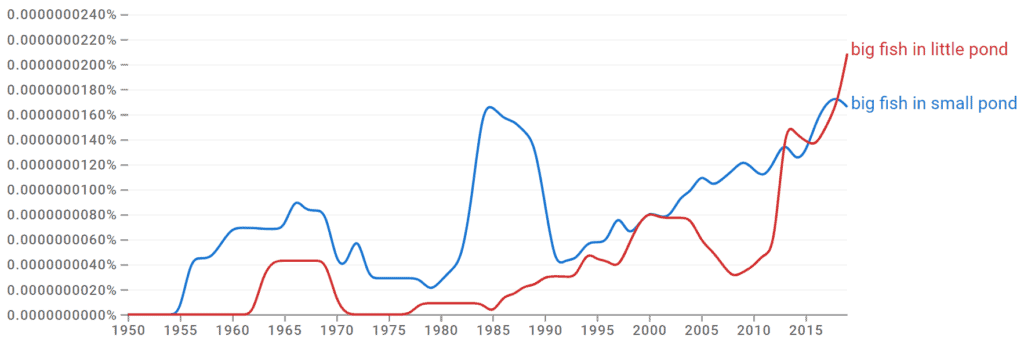To be a big fish in a small pond isn’t exactly the best thing to be. This idiom describes someone who isn’t motivated to be more than they already are. The term has been used since the late 19th century and is still a popular aphorism or observation of human behavior.
In this article, let’s learn about the origins and use of the idiom big fish in a small pond.
What Is the Meaning of a Big Fish in a Small Pond?

Big fish in a small pond is an idiom that describes someone important within their limited sphere but not in the larger world. For instance, a city councilman would be an essential person in that particular city where he may yield power but would not be important in a neighboring town or a country as a whole.
The phrase may also be considered an aphorism (a general observational truth). It denotes that some people are content to have a small sphere of influence rather than nothing at all. Occasionally, the phrase a small fish in a big pond means that someone is unimportant and powerless outside their narrow realm of influence.
A big fish in a small pond usually hints at a person’s lack of overall motivation. It also serves as a low-key criticism of somebody feeling more important than they really are and who wouldn’t be able to be successful in a “bigger pond.”
For example:
- When the business was sold, its sphere of influence went from being a big fish in a small pond to a tiny player in a much larger developing market.
- Sarah’s basketball skills made her the neighborhood’s star player, solidifying her status as a big fish in a small pond.
- Upon graduating high school, John became the editor-in-chief of the local newspaper, feeling like a big fish in a small pond.
Origins of a Big Fish in a Small Pond
Like most idioms, the term was most likely used long before it was made into print. The first known documentation of the phrase in print was in June of 1881 in The Galveston Daily News:
- They [local vested interests in Galveston] are big fish in a small pond.
Big Fish in a Small Pond or Little Pond?

The term stayed true to its original form for a century. However, the variation big fish in a little pond has more recently taken precedence due to a study conducted in 1984 concerning a frame of reference model about educational self-concepts.
The big-fish-little-pond effect (BFLPE) model explains how students compare themselves to peers and have a higher view of their capabilities when they view their peers as less capable. The focus is designed for educational models. However, it can be applied in everything from corporate business to other human interaction observations.
Since the 1980s, the idiomatic use of big fish in a little pond has slowly edged out the use of big fish in a small pond. Since they both mean the same thing, the variations are interchangeable.
Let’s Review
Idioms help describe certain behaviors or actions through figurative language. The phrase big fish in a small pond has been used since the 19th century. It describes an essential person within a limited sphere of influence who would be less successful in a larger community.
It is a low-key way of criticizing a person who perhaps thinks more of themselves due to their small circle of influence but who wouldn’t be able to handle more responsibility.
